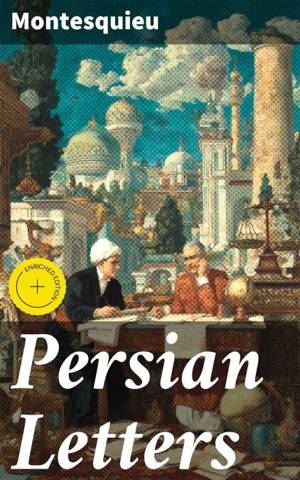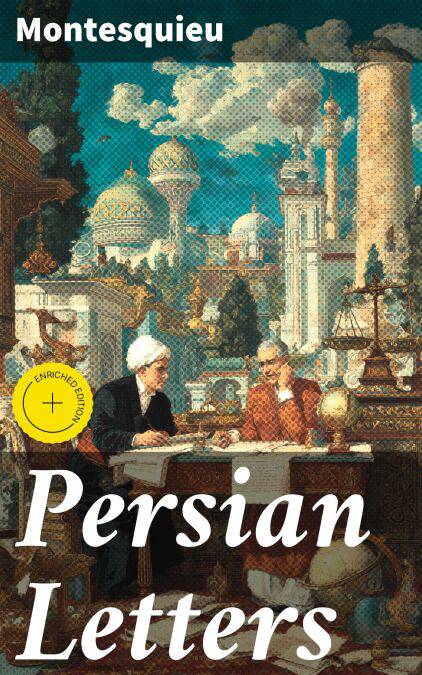
Bedankt voor het vertrouwen het afgelopen jaar! Om jou te bedanken bieden we GRATIS verzending (in België) aan op alles gedurende de hele maand januari.
- Afhalen na 1 uur in een winkel met voorraad
- In januari gratis thuislevering in België
- Ruim aanbod met 7 miljoen producten
Bedankt voor het vertrouwen het afgelopen jaar! Om jou te bedanken bieden we GRATIS verzending (in België) aan op alles gedurende de hele maand januari.
- Afhalen na 1 uur in een winkel met voorraad
- In januari gratis thuislevering in België
- Ruim aanbod met 7 miljoen producten
Zoeken
Persian Letters E-BOOK
Enriched edition. Insightful Satire on 18th-Century Society and Politics
Montesquieu
E-book | Engels
€ 1,99
+ 1 punten
Uitvoering
Omschrijving
In "Persian Letters," Montesquieu ingeniously employs the epistolary form to explore the contrasts between Eastern and Western societies during the early 18th century. Through the fictional correspondence of two Persian travelers, Usbek and Rica, the text critiques European customs, politics, and social norms while revealing the absurdities and contradictions inherent in contemporary French society. The work is characterized by its sharp wit and incisive satire, allowing Montesquieu to deftly navigate complex themes such as individual liberty, governance, and cultural relativism within a growing Enlightenment context that sought to challenge established traditions and hierarchies. Montesquieu, a pivotal figure of the Enlightenment, combined philosophical inquiry with political analysis, influenced profoundly by his own experiences as a French nobleman and observer of absolute monarchy. His exposure to varying cultural practices and norms, alongside his advocacy for the separation of powers, are evident throughout "Persian Letters," where he questions the foundations of societal structures and encourages readers to re-evaluate their perspectives on civilization and progress. This seminal work is indispensable for readers interested in political theory, cultural studies, and the development of Enlightenment thought. Montesquieu's keen insights and compelling narrative make "Persian Letters" not only a critical exploration of 18th-century Europe but also a relevant commentary for contemporary discussions on cultural differences and the nature of governance.
In this enriched edition, we have carefully created added value for your reading experience:
- A succinct Introduction situates the work's timeless appeal and themes.
- The Synopsis outlines the central plot, highlighting key developments without spoiling critical twists.
- A detailed Historical Context immerses you in the era's events and influences that shaped the writing.
- An Author Biography reveals milestones in the author's life, illuminating the personal insights behind the text.
- A thorough Analysis dissects symbols, motifs, and character arcs to unearth underlying meanings.
- Reflection questions prompt you to engage personally with the work's messages, connecting them to modern life.
- Hand‐picked Memorable Quotes shine a spotlight on moments of literary brilliance.
- Interactive footnotes clarify unusual references, historical allusions, and archaic phrases for an effortless, more informed read.
In this enriched edition, we have carefully created added value for your reading experience:
- A succinct Introduction situates the work's timeless appeal and themes.
- The Synopsis outlines the central plot, highlighting key developments without spoiling critical twists.
- A detailed Historical Context immerses you in the era's events and influences that shaped the writing.
- An Author Biography reveals milestones in the author's life, illuminating the personal insights behind the text.
- A thorough Analysis dissects symbols, motifs, and character arcs to unearth underlying meanings.
- Reflection questions prompt you to engage personally with the work's messages, connecting them to modern life.
- Hand‐picked Memorable Quotes shine a spotlight on moments of literary brilliance.
- Interactive footnotes clarify unusual references, historical allusions, and archaic phrases for an effortless, more informed read.
Specificaties
Betrokkenen
- Auteur(s):
- Vertaler(s):
- Uitgeverij:
Inhoud
- Aantal bladzijden:
- 240
- Taal:
- Engels
Eigenschappen
- Productcode (EAN):
- 4064066466343
- Verschijningsdatum:
- 9/04/2021
- Uitvoering:
- E-book
- Beveiligd met:
- Digital watermarking
- Formaat:
- ePub

Alleen bij Standaard Boekhandel
+ 1 punten op je klantenkaart van Standaard Boekhandel
Beoordelingen
We publiceren alleen reviews die voldoen aan de voorwaarden voor reviews. Bekijk onze voorwaarden voor reviews.









